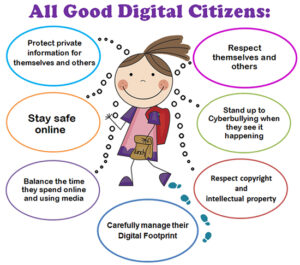As the rate of technological advancement continues to increase, the world is becoming more and more dependent on the Internet for day-to-day activities. This can mean checking a bank account, booking a railway ticket, purchasing a product, or simply keeping in touch with a friend. Every internet user is a digital citizen, performing a variety of activities every day. This variety of tasks leads him/her through a journey of wishing well for oneself and others, making prudent choices and decisions, interpreting perspectives, being conscious of one’s actions, knowledge of technology and understanding the impact.
Digital citizenship refers to the responsible use of technology by anyone who uses computers, the Internet, and digital devices to engage with society on any level.

Good digital citizenship engages young students and shows them how to connect with one another, empathize with each other, and create lasting relationships through digital tools. Bad digital citizenship, on the other hand, entails cyberbullying, irresponsible social media usage, and a general lack of knowledge about how to safely use the Internet.
It is important for us to equip our children to become responsible digital citizens. And, how do we do that? A good starting point might be to make them aware of the following-
- Empathy
Empathy is crucial to understanding how people talk and behave online. Since the Internet use relies largely on text-based communication, it is impossible to hear someone’s vocal tone, see their facial expressions, or understand their non-verbal cues, which we may get when we speak to the person face-to-face. It is easy for Internet users to make impulsive, harsh judgments about someone’s statements online. This might lead to trading quick verbal blows, hurting someone’s feelings and also has the potential to devolve into cyberbullying, which is the most prevalent and dangerous problem for young internet users today.
- Understanding of how the Internet Works
The internet is vast and fast. A simple task like sending a text message or a note on WhatsApp, though seemingly happens in a flick, actually runs through many layers of hardware and software, tools and technologies. Though it is not possible for the user to know every detail, it is important to know and appreciate how they work together, things that can go right or wrong and their implications.
- Sensitivity of User Information
Whenever you go to any website, you’re tracked by some software that sees your “footprint.” When you return, the same software matches up the previous footprint with the current and throws up suitable content, advertisements and other click-baits. The websites know who you are, how often you have visited and the content you have accessed.
- Digital Literacy
Digital literacy is the practice of reading information online and understanding the meaning, source and accuracy. Understanding credibility of the source, validity, perspective, relevance, application and accuracy are important and children need guidance with these. Digital literacy also includes learning internet etiquette and internet safety.

Besides the above, children need to be sensitised to the digital divide that is widely prevalent and to the idea of balancing time between online/offline activities.
Digital divide is the disparity between those who have access to modern digital tools (like computers and the Internet) and those who don’t. This is prevalent even in rich countries. Not everyone has access to the same resources; that does not and should not mean, in any way, that they don’t have the right to the same information.
Digital wellness is about knowing when to “take a break” from the screen. Too much screen time can lead to obesity, sleep problems, chronic neck and back problems, depression, anxiety and lower test scores in children.
The final and the most critical element of becoming a good digital citizen is to secure one’s own digital devices. Getting and using a cell phone is a right of passage for today’s teens. What’s worrying is that click-baits, fake news and cyberbullying are the most natural fallouts, in varying degrees of severity. Children need to be taught how to secure and protect personal information. Data privacy, security and safe internet use are integral to digital literacy today, particularly so for children, who are more vulnerable and prone to harm.
That said, today’s digital learners also need to understand the power they have to advocate, collaborate and drive change through technology – be it by innovating, campaigning or interacting. In an increasingly tech-based world digital citizenship posits that digital citizens are learners who use their technology-driven powers conscientiously — and with empathy — to help make the world a better place.













